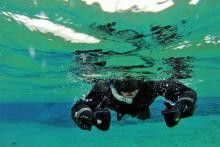Penn State alumni Brian and Terri Green said three reasons sparked their decision to establish the Robert and Florence Green Memorial Scholarship in the College of Earth and Mineral Sciences.
Penn State once again has been recognized by the U.S. Department of State’s Bureau of Educational and Cultural Affairs as one of the U.S. colleges and universities that produced the most Fulbright Scholars in the 2016-17 awards cycle. This year, 11 scholars were recipients of this prestigious grant and Penn State tied for second place.
The Alliance for Education, Science, Engineering and Development in Africa (AESEDA) and the Department of African American Studies at Penn State are sponsoring the Black History Month PSU Scholar’s Program. Four panel discussions, highlighting scholarship by Penn State faculty members of African descent, will take place from Feb. 16 to 22 in Foster Auditorium of Pattee Library on the University Park campus.
It’s as if everything Amanda Berta touches turns to gold. Last year, the senior majoring in energy engineering in Penn State's College of Earth and Mineral Sciences (EMS) won an NCAA title with the Penn State women’s soccer team. Then, seeking more time on the field, she switched to rugby. The result? Another national title.
Annie Tamalavage and Marla Korpar, both 2013 EMS graduates, were among a handful of judges who returned to Penn State’s University Park campus to serve as judges for the College of Earth and Mineral Sciences’ (EMS) Undergraduate Poster Exhibition.
Adam Phoebe, a 2012 Penn State energy engineering graduate, is director of global operations for the Global Renewable Energy Education Network or GREEN program, a position he obtained after first becoming a student ambassador for the program.
If you are interested in environmental issues associated with the extraction, processing, and use of mineral and energy resources and their solutions, you should consider pursuing a minor in environmental systems engineering. The program provides an opportunity for students to understand and appreciate the relationship between energy and the environment, be exposed to the basic courses in environmental systems engineering, and to appreciate and evaluate the impact of environmental pollution control on viability of the profitability and feasibility of operations associated with the safe extraction, processing, and utilization of mineral and energy resources.
The minor in Energy Engineering is designed to provide students in engineering, science, and energy business and finance (EBF) with additional courses, exposure, and experiences to the principles and applications of energy engineering. Courses include thermal sciences; petroleum and natural gas processing; renewable/sustainable energy; chemistry of fuels; electrochemical, chemical, and nuclear energy conversion processes; physical processes in energy engineering; air pollution; and green engineering and environmental compliance.
Addressing society’s clean energy needs and demands is the core focus of the electrochemical engineering minor. The minor integrates skill sets in fundamentals of electrochemistry (e.g. chemistry, physics, mathematics, thermodynamics, and chemical kinetics) and electrochemical engineering applications (batteries, solar, flow and fuel cells, electrochemical synthesis and corrosion) to ensure successful career opportunities and growth within electrochemical power generation industries, government agencies, and academia.
The curriculum should allow students in energy related programs such as chemical, civil, electrical, environmental, mechanical, and materials science and engineering to readily take advantage of the minor and be better prepared for careers in clean power generation and future green technologies.
Learn ways to make industrial and environmental remediation activities healthier, safer, more environmentally friendly, and more cost-effective in the Environmental Systems Engineering major. The program is designed to address the critical environmental, safety, and health problems of the basic industries involved in the extraction, conversion, and utilization of energy and mineral resources. Students can gain a deeper understanding of both the impact of environmental degradation on society and the effects on industrial activity of society's demands for protection of workers and the environment.
Program Options
This major has two options:
- Environmental Systems Engineering (ENVSE)
This option is concerned with the impact of industrial activities on the environment and the choice of cost-effective remediation strategies. - Environmental Health and Safety Engineering (ENVHS)
This option is concerned with safe and healthful design of industrial systems such that workers are protected from potentially high risk exposures associated with today's industries.
Careers
Graduates are prepared to enter both the private and public sectors as environmental systems engineers or health and safety engineers or to pursue further education at the graduate level.
Where Environmental Systems Engineering Graduates Find Jobs
- Environmental consulting firms
- NGOs
- Government agencies
ABET Accreditation
TThe Bachelor of Science in Environmental Systems Engineering at University Park is accredited by the Engineering Accreditation Commission of ABET, https://www.abet.org, under the commission’s General Criteria and Program Criteria for Environmental Engineering and Similarly Named Engineering Programs.
Student Clubs and Organizations
- Engineers for a Sustainable World
- Engineers Without Borders
- Society of Environmental Systems Engineers (SESE)
Option to earn your B.S. and M.S. in 5 years
- Integrated B.S./M.S. Degree Program: The integrated undergraduate-graduate (IUG) enables academically superior and research-focused undergraduate students to also obtain an M.S. degree in Energy and Mineral Engineering in five years of study.







